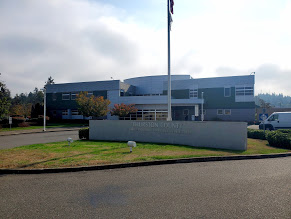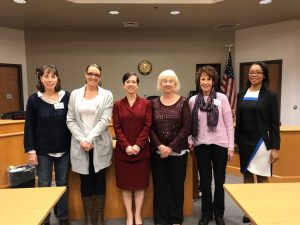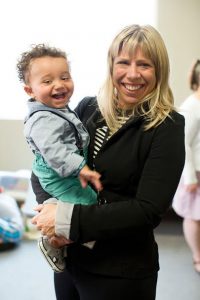Family court cases are never easy, especially when they involve children who have been removed from their parents’ custody for their own safety. For a judge to determine the best course of action, clear, accurate and neutral information is vital. The volunteers at Thurston County Dependency Guardian Ad Litem (DGAL) play an essential part in providing such information, serving as the eyes and ears of the court without being directly connected to the state judicial system.
 “The DGAL’s only role is to serve and report on the best interests of the child,” says Superior Court Judge Anne Hirsch. “They understand and are trained in trauma and the requirement that family reunification is prioritized. I depend on receiving current information from the DGAL volunteers and that information is critically important to me as I make decisions on child safety and wellbeing and family reunification.”
“The DGAL’s only role is to serve and report on the best interests of the child,” says Superior Court Judge Anne Hirsch. “They understand and are trained in trauma and the requirement that family reunification is prioritized. I depend on receiving current information from the DGAL volunteers and that information is critically important to me as I make decisions on child safety and wellbeing and family reunification.”
The program, formerly known as CASA, appoints volunteers to dependency cases, i.e. those in which children have been removed from their homes due to abuse or neglect. They observe the children in school and during visitations with parents or at their foster homes. In some cases, they will attend Individualized Educational Program (IEP) meetings at the child’s school to make sure the student is staying on track. They then report their observations to the courts and make recommendations about custody and living arrangements based on those findings.

“Our volunteers come into this as very neutral parties who advocate for what they think is in the child’s best interest,” says DGAL Program Manager Wendy Mayo. “Often they are the one person in court who has the most information. They’re usually assigned no more than three kids so they really get to know the child and understand what they’re individual needs might be.”
Since COVID-19 hit, the role became more challenging with social distancing and virtual meetings replacing in-person interaction, but they have persevered, according to Mayo. “Our volunteers are very active right now,” she says. “One of their big focuses is making sure parents, or whoever is caring for the child, has the resources they need so they can participate in school. It’s hard enough for anyone, let alone someone with significant barriers. We want to make sure these kids aren’t falling farther behind.”
The pandemic has also made volunteer recruitment more difficult. “It’s hard to get volunteers in general,” says Mayo. “Our job is really hands-on, but we’re learning to use technology to interview kids and find out about their situations, so finding people and training them to do that is a bit more challenging.”

Regardless, the role is incredibly rewarding, according to Dan Silver, a retired state worker from the Department of Ecology and the Washington State Energy Office who has been volunteering with the program for approximately 17 years. “Here you are, dealing in a world of dreadful things like child abuse and drug abuse and sexual abuse,” he says, “and yet there are so many people working so hard on behalf of the children – the social workers, the service providers, the attorneys and judges. It’s a wonderful feeling to engage with these people, including the foster parents and extended families that recognize there is a problem and step forward. I find it absolutely uplifting.”
Janet Pearson has noticed other benefits of the role. A former casualty claims adjuster, retail manager and stay-at-home mom, Pearson was initially unsure about volunteering. “I felt I needed to do something different,” she says. “I’ve stayed involved because I’m always learning. I get great support and it’s never the same work. It’s an ideal volunteer position.”

DGAL volunteers stay with children through the duration of their court cases, developing relationships along the way. “You hold information that no one else does,” says Pearson. “It’s a lot of responsibility but I enjoy working with the kids and encouraging parents to make changes, helping families get to a good solution.”
Even when parents aren’t appreciative in the moment, many later realize the value DGAL volunteers provide, says Mayo. “We really believe that parents can and do change. We often will have parents who say, ‘I was so angry to have my kids removed, but I realize now that I wasn’t being the kind of parent I needed to be,’ and they’re actually grateful for our services.”
For anyone interested in volunteering, prepare to be changed by the experience, Silver warns. “This will open up the world in a way that you have never seen before,” he says. “I’ve learned that no matter what terrible things these parents have done to their children, they still love them. Many come from horrific backgrounds and I got into a frame of mind where I never judge them. It opened up my whole world to engage with these folks and it’s expanded my sense of humanity.”
To learn more about becoming a volunteer visit the Dependency Guardian Ad Litem website or call 360-709-3137.


















































